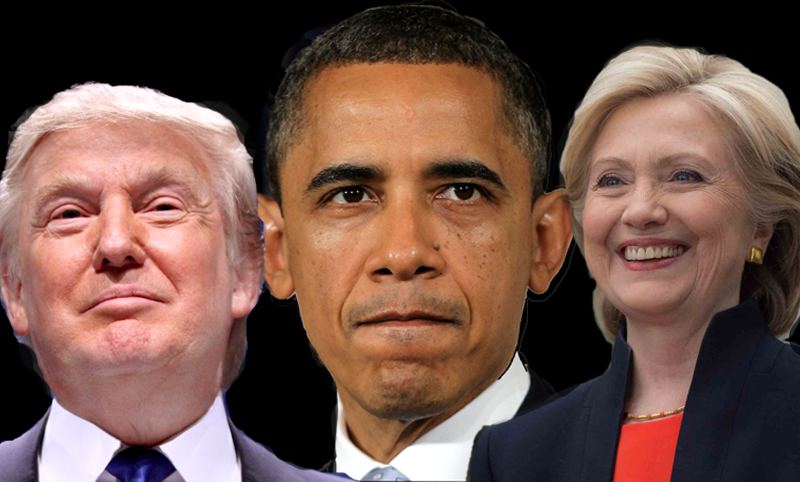Steve Kramer – Will He Or Won’t He
In the immediate aftermath of the American presidential election, the New York Times wrote, “For not the first time this year, those analyzing this election missed what was happening all around them — and it was the story of a lifetime.” This is probably the understatement of the year, considering the fawning, slanted “reporting” that the NYT and the Washington Post (and many others) presented to their audience. But we’re beyond that now; it’s time to deal with the consequences of this unique election, with the first non-politician ever voted to be the leader of America – and the Free World.
The question, “Will he or won’t he,” is two-fold. First, will lame duck President Obama attempt to officially change the parameters of the Israeli-Palestinian conflict, perhaps by replacing UN Security Council resolution 242 with one that sacrifices Israel’s security to appease the Muslims?
If either Hillary Clinton or Donald Trump were elected to the presidency, Hillary might have attempted to stop any arbitrary move of the outgoing president concerning Israel. This would have been understandable, since no president would appreciate his or her predecessor setting new guidelines on the way out of office. Resolution 242 is in danger of replacement by the president. It’s a well thought out Security Council resolution which practically guarantees that Israel won’t commit suicide by “giving” the Palestinian Arabs a state.
The principal condition of Resolution 242, enacted just months after the 1967 Six Day War, is that Israel withdraw from “territories occupied” in 1967, which means that Israel must withdraw from some, all, or none of the territories still occupied. Israel withdrew from 91% of the territories it controlled when it gave up the huge (compared to Israel) Sinai Peninsula in its 1977 peace treaty with Egypt. Sinai is not considered part of the Land of Israel, homeland of the Jewish people.
Another very important condition of the resolution is the requirement for “secure and recognized boundaries” between the adversaries. Arthur Goldberg, America’s ambassador to the UN at the time, commented that the parties were expected to make “territorial adjustments in their peace settlement encompassing less than a complete withdrawal of Israeli forces from occupied territories, inasmuch as Israel’s prior frontiers had proved to be notably insecure.” (jewishvirtuallibrary.com)
The United Nations has proven to be an enemy of Israel, due to the guaranteed majority of the Muslim states combined with the non-Muslim nations which vote with them for political reasons. If President Obama were to propose more stringent conditions on Israel, solidifying the “land for peace” misconception and a division of Jerusalem, it would pass easily.
President elect Trump must oppose replacing Resolution 242. Obama could graciously refrain from harming Israel because Mr. Trump obviously is against wounding a great ally. Or, Obama could refrain from pursuing this agenda because Mr. Trump, the incoming Commander in Chief, is in a position to pressure the outgoing chief executive in many ways. Obviously, this would be a last resort.
Second, will or won’t president elect Trump fulfill his campaign promise: to recognize Jerusalem as the undivided capital of the State of Israel, cemented with the move of the American embassy from Tel Aviv to Jerusalem.
H.R. 2846, amended in 2013, requires the president to move the embassy:
Recognition of Jerusalem as the Capital of the State of Israel Act- Expresses the sense of Congress that: (1) the United States should recognize the sovereign status of an undivided Jerusalem as Israel’s capital; (2) recognizing Jerusalem as Israel’s capital and transferring the U.S. Embassy to Jerusalem from Tel Aviv will send a signal of U.S. commitment to Israel; and (3) the Secretary of State should transfer the Embassy to 14 David Flusser Street, Jerusalem, repurpose or sell the Embassy in Tel Aviv, and deposit any sale proceeds in the Asset Management Account of the Department of State.
The bill contains a waiver that allows the president to defer the moving of the embassy for six months, and every president, Democrat or Republican, has used this waiver, even if it meant breaking a campaign promise. If President Trump declared that the American Embassy in Tel Aviv would be relocated to Israel’s capital Jerusalem, it would be a wake-up call to the Arab and Muslim world. They would realize that the world’s strongest nation had unequivocally backed Israel and was willing to set the precedent to have its embassy located in Israel’s capital.
The Arab tactic of agreeing to nothing now, in order to gain more concessions later, would be discredited. The Arabs would be forced to face reality and to finally begin to deal with their refugees. This is what Israel did in the decade after 1948, when it successfully integrated more than a million Jews into the new state from Arab countries and displaced persons camps in Europe, after having won its War of Independence.
The incoming president has a mandate for change. Now is not the time to waive the conditions of the Jerusalem bill, but to immediately announce a competition for the building of the new American embassy, and to signal to the world that Jerusalem is unconditionally Israel’s capital, despite the many frivolous actions of the United Nations General Assembly, UNESCO, and other UN organs. Let’s hope that political correctness, which the majority of American voters vigorously voted down, will be banished from the political lexicon and that the American government will pursue policies which will strengthen both its and Israel’s interests in the Middle East.









